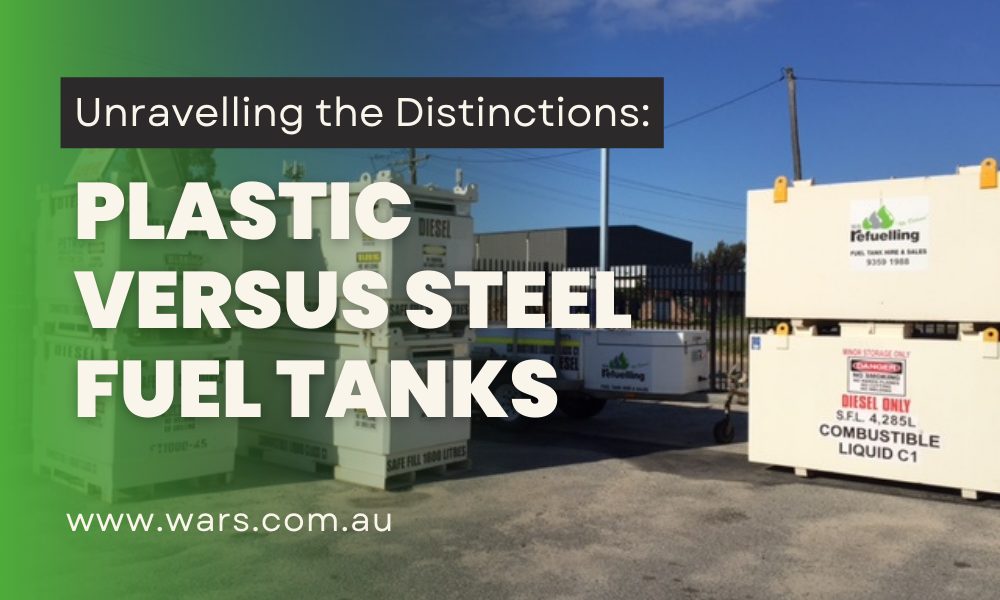
When it comes to fuel tank materials, two contenders emerge: plastic and steel. Each boasts its own array of advantages and disadvantages, catering to diverse needs and preferences.
Understanding the disparities between these two options is crucial for making an informed decision.
At WA Refuelling, we have installed both plastic and steel fuel tanks and, from our experience, there are scenarios where each is best.
Let’s explore the intricacies of steel versus plastic fuel tanks to determine which best suits your requirements.
Difference Between Plastic Versus Steel Fuel Tanks
Material Composition
Plastic fuel tanks are typically crafted from high-density polyethylene (HDPE) or cross-linked polyethylene (XLPE), and offer lightweight and corrosion-resistant properties. HDPE tanks are formed through the process of blow moulding, ensuring durability and flexibility. XLPE tanks, on the other hand, undergo a more intricate manufacturing process, rendering them capable of withstanding higher temperatures and pressures.
Steel fuel tanks are renowned for their robustness and are predominantly fabricated from galvanised steel or stainless steel. Galvanised steel tanks are coated with zinc to prevent rust and corrosion, making them ideal for withstanding harsh environmental conditions. Meanwhile, stainless steel tanks excel in durability, offering exceptional resistance against corrosion, impact, and punctures.
Weight Consideration
One of the most prominent advantages of plastic fuel tanks lies in their lightweight nature. This enables them have more fuel efficiency and ease of handling during installation and maintenance procedures. Additionally, the lightweight construction minimises the overall vehicle weight, contributing to enhanced performance and reduced fuel consumption.
While steel fuel tanks are undeniably sturdy, they tend to be heavier compared to their plastic counterparts. The weight of steel tanks can potentially impact vehicle dynamics, particularly in terms of fuel efficiency and manoeuvrability. However, this drawback is often outweighed by the unparalleled durability and longevity offered by steel constructions.
Resistance to Corrosion and Impact
Resilient against corrosion, plastic fuel tanks excel in longevity, particularly in regions prone to rust-inducing elements such as moisture and salt. Furthermore, plastic tanks exhibit commendable impact resistance, minimising the risk of damage in the event of collisions or rough terrain encounters.
Renowned for their exceptional durability, steel fuel tanks boast unparalleled resistance to impact and punctures. The robust construction of steel tanks ensures optimal protection against external forces, safeguarding the fuel supply and mitigating the risk of leaks or spills. Additionally, the corrosion-resistant properties of galvanised or stainless steel further enhance the longevity of these tanks.
Cost-effectiveness
In terms of upfront costs, plastic fuel tanks often prove to be more budget-friendly compared to their steel counterparts. The relatively simple manufacturing process of plastic tanks contributes to their affordability, making them an attractive option for cost-conscious consumers.
However, while steel fuel tanks may entail higher initial investments, their longevity and durability often justify the additional expense in the long run. Steel tanks require minimal maintenance and replacement, translating to substantial cost savings over their lifespan. Their robustness also ensures optimal protection of the fuel supply, reducing the risk of potential leaks or environmental hazards.
Environmental Impact
Recognised for their eco-friendly attributes, plastic fuel tanks are recyclable, contributing to the reduction of environmental footprint. Furthermore, the lightweight nature of plastic tanks enhances fuel efficiency, thereby reducing carbon emissions and promoting sustainability.
While steel fuel tanks are not as readily recyclable as their plastic counterparts, they boast impressive longevity and durability, minimising the frequency of replacements and associated environmental impact. Additionally, the corrosion-resistant properties of steel tanks ensure optimal containment of fuel, mitigating the risk of soil or water contamination.
Contact WA Refuelling for Your Ideal Fuel Tank!
The choice between plastic and steel fuel tanks hinges on a multitude of factors, including durability requirements, cost considerations, and environmental preferences. While plastic tanks offer lightweight and corrosion-resistant properties, steel tanks excel in durability and impact resistance. Ultimately, selecting the most suitable option entails a careful evaluation of individual needs and priorities, ensuring optimal performance and longevity in the realm of fuel storage and transportation.
Ready to make the right choice for your fuel storage needs? Contact the experienced team at WA Refuelling on (08) 9359 1988 to discuss your requirements for fuel tanks for hire or sale in Perth and find the perfect solution tailored to your business.
